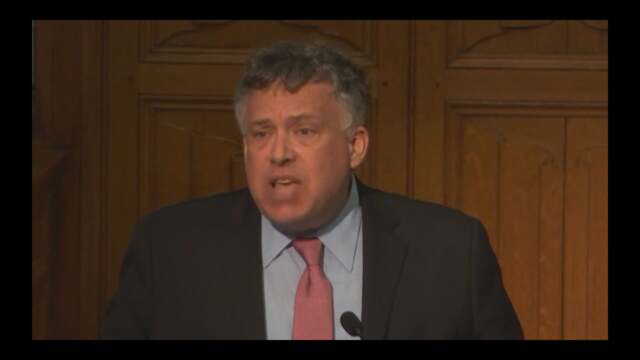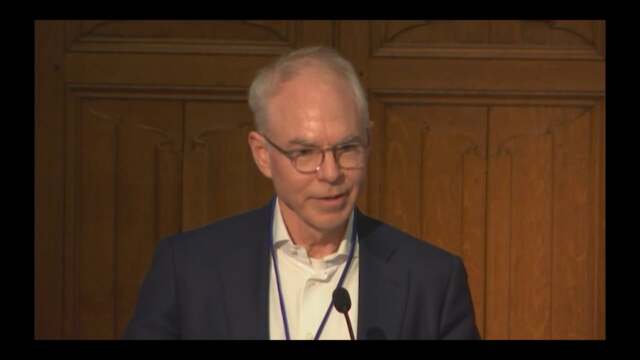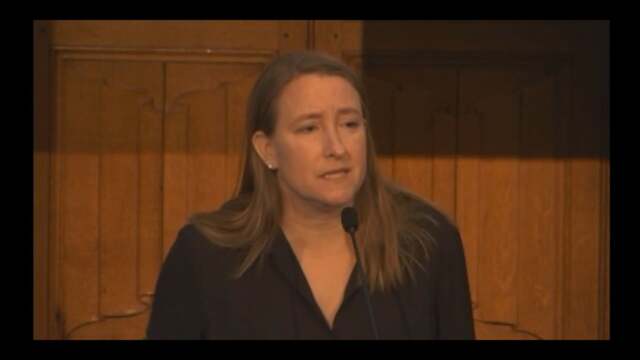New Regulations Require Better Communication With Patients Who Have Disabilities and Limited English Proficiency
Ever since President Barack Obama signed the Patient Protection and Affordable Care Act (ACA) into law on March 23, 2010, the nondiscrimination provision of the law, Section 1557, which prohibits discrimination on the basis of race, color, national origin, sex, age, or disability in certain health ...
Will the Trump Administration’s Plan to Reduce Cancer Drug Prices Work?
High drug prices are the number one health-care concern of many Americans. The average price of a cancer drug rose from less than $10,000/yr before 2000 to more than $170,000/yr in 2017.1-3 Between 1995 and 2013, the launch price of cancer drugs increased by 10% to 12% every year, and the average...
Health-Policy Forum Focuses on New Care-Delivery Paradigms
What was an MBA doing at the podium of a clinical oncology meeting? Ten years ago or so, that might have been surprising. But in an era of rapid change—in therapies, costs, payment models, and practice—it only makes sense. Amy Porter-Tacoronte, MBA, Health System Chief Administrative Officer at the ...
Medicaid Work Requirements Could Reduce Vulnerable Patients’ Access to Cancer Care
In a recent position statement, ASCO warns that Medicaid work requirements may hinder patient access to essential cancer care and reduce the already limited time physicians are able to spend with their patients. ASCO also recommends that federal and state policymakers take specific steps to ensure...
AACR Releases Annual Cancer Progress Report
The American Association for Cancer Research (AACR) has released its annual Cancer Progress Report highlighting how federally funded research discoveries are fueling the development of new and even more effective ways to prevent, detect, diagnose, and treat cancer. Key advances outlined...
Medical Groups Release Letter on Proposed Changes to Medicare Physician Payment Rule
The American Medical Association and about 150 medical groups sent the following letter to Seema Verma, Administrator of the Centers for Medicare and Medicaid Services (CMS), regarding the administration’s proposals included in the 2019 Medicare physician payment rule. The full text of...
CMS Proposes Extended 340B Cuts for 2019
ON JULY 25, the Centers for Medicare & Medicaid Services (CMS) released its 2019 Hospital Outpatient Prospective Payment System proposed rule. Among other provisions, the proposal would extend 2018 reimbursement cuts to the 340B Drug Pricing Program to include currently excepted, off-site...
ASCO Statement: Step Therapy Creates Barriers to Care for Medicare Advantage Beneficiaries With Cancer
Monica M. Bertagnolli, MD, FACS, FASCO, ASCO President, released the following statement today: “ASCO strongly opposes the Centers for Medicare & Medicaid Services (CMS) decision to allow Medicare Advantage plans to employ step therapy across physician-administered and self-administered...
Is Universal Health Care a Human Right?
The Affordable Care Act (ACA) provided oncology services to people with cancer who had previously been denied coverage. And for that reason alone, many oncologists supported its passage. However, even though the U.S. health-care system remains in the crosshairs of partisan politics, parties on both ...
Is the Move to a Value-Based Health-Care Delivery System Feasible?
In 2015, Congress passed the Medicare Access and CHIP Reauthorization ACT (MACRA), which aims to move Medicare toward reimbursement based more on outcomes and values, a goal, in theory, shared by the oncology community. To shed light on the complicated and problematic attempt to restructure the...
Cost Differences in Chemotherapy Administration by Site
Critics of health-care consolidation have cited higher costs of chemotherapy administration as an example of how mergers drive up costs. A new study by Kalidindi et al in The American Journal of Managed Care found that although drug administration costs in hospitals are higher,...
Study Evaluates Effects of Affordable Care Act on Young Women With Gynecologic Cancer
The gains in insurance coverage with the Patient Protection and Affordable Care Act (ACA) have already translated into improved health for young women with gynecologic cancers, who are getting diagnosed at earlier stages of their disease because of ACA benefits. That’s the conclusion of a new ...
COA Practice Impact Report Details Consolidation, Shift of Cancer Care System Into Hospital Setting
THE COMMUNITY ONCOLOGY Alliance (COA) has released the 2018 Community Oncology Practice Impact Report,1 which tracks data on the changing landscape of cancer care in the United States. It details a decade-long trend of closure and consolidation in the U.S. cancer system that has resulted in a...
Roy Herbst, MD, PhD, on Legal and Policy Issues Associated With Cutting-Edge Cancer Treatments
Roy Herbst, MD, PhD, Chief of Medical Oncology, Yale Cancer Center and Smilow Cancer Hospital, speaks during Panel 5: Legal and Policy Issues Associated With Cutting-Edge Cancer Treatments at The Policy, Politics and Law of Cancer, presented by The Solomon Center for Health Law and Policy at Yale Law School, in collaboration with Smilow Cancer Hospital and Yale Cancer Center.
COA Practice Impact Report Details Consolidation, Shift of U.S. Cancer Care System Into More Expensive Hospital Setting
The Community Oncology Alliance (COA) has released the 2018 Community Oncology Practice Impact Report, which tracks data on the changing landscape of cancer care in the United States. It details a decade-long trend of closure and consolidation in the U.S. cancer system that has resulted in a...
Charles Sawyers, MD, on Legal and Policy Issues Associated With Cutting-Edge Cancer Treatments
Charles Sawyers, MD, Chair, Human Oncology and Pathogenesis Program, Memorial Sloan Kettering Cancer Center, speaks during Panel 5: Legal and Policy Issues Associated With Cutting-Edge Cancer Treatments at The Policy, Politics and Law of Cancer, presented by The Solomon Center for Health Law and Policy at Yale Law School, in collaboration with Smilow Cancer Hospital and Yale Cancer Center.
Richard Schilsky, MD: Is the Federal Government a Productive Partner in Cancer Policy?
Richard Schilsky, MD, Chief Medical Officer, ASCO, speaks during Panel 1: Is the Federal Government a Productive Partner in Cancer Policy? at The Policy, Politics and Law of Cancer, presented by The Solomon Center for Health Law and Policy at Yale Law School, in collaboration with Smilow Cancer Hospital and Yale Cancer Center.
Nancy Goodman, JD, MPP: Is the Federal Government a Productive Partner in Cancer Policy?
Nancy Goodman, JD, MPP, Executive Director, Kids V Cancer, speaks during Panel 1: Is the Federal Government a Productive Partner in Cancer Policy? at The Policy, Politics and Law of Cancer, presented by The Solomon Center for Health Law and Policy at Yale Law School, in collaboration with Smilow Cancer Hospital and Yale Cancer Center.
Nancy Goodman, JD, MPP: Is the Federal Government a Productive Partner in Cancer Policy?
Nancy Goodman, JD, MPP, Executive Director, Kids V Cancer, speaks during Panel 1: Is the Federal Government a Productive Partner in Cancer Policy? at The Policy, Politics and Law of Cancer, presented by The Solomon Center for Health Law and Policy at Yale Law School, in collaboration with Smilow Cancer Hospital and Yale Cancer Center.
Nancy Goodman, JD, MPP: Is the Federal Government a Productive Partner in Cancer Policy?
Nancy Goodman, JD, MPP, Executive Director, Kids V Cancer, speaks during Panel 1: Is the Federal Government a Productive Partner in Cancer Policy? at The Policy, Politics and Law of Cancer, presented by The Solomon Center for Health Law and Policy at Yale Law School, in collaboration with Smilow Cancer Hospital and Yale Cancer Center.
Investigational in Vitro Diagnostics in Oncology Trials: Streamlined Submission Process for Study Risk Determination
On April 16, 2018, the U.S. Food and Drug Administration (FDA) issued a draft guidance, “Investigational in Vitro Diagnostics in Oncology Trials: Streamlined Submission Process for Study Risk Determination,” to describe for sponsors of certain oncology trials an optional streamlined...
Advancing Cancer Research in Challenging Times
ON OCTOBER 17, 2017, Norman E. Sharpless, MD, became the 15th Director of the National Cancer Institute (NCI), succeeding Harold E. Varmus, MD, who stepped down as Director of the agency in March 2015, and replacing Douglas R. Lowy, MD, who had served as Acting Director for 2 years. The...
Why Right-to-Try Laws Are Dangerous
Why wouldn’t you support a patient with a terminal illness the “right to try” any therapy that may save his or her life? The answer to this question—one engulfed in a political debate in Congress—seems simple. It is not. [Editor’s Note: On May 30, 2018, the President signed into law the Trickett...
AMA Urges Physicians to Take Steps to Avoid Medicare Payment Penalty
The American Medical Association (AMA) is reminding physicians that the Medicare reimbursement system has changed, and, if they have not done so already, they have until December 31, 2017, to take a few simple steps to avoid a Medicare payment penalty in 2019. The changes are part of the...
How ASCO’s New Initiatives Are Helping Oncologists Transition to MACRA
This year has been an important transitional period for oncology providers to start collecting their performance data to meet the requirements of the Quality Payment Program outlined in the Medicare Access and CHIP Reauthorization Act of 2015 (MACRA). The Quality Payment Program is a...
Health-Care Access Unlikely to Explain Racial/Ethnic Disparities in Breast Cancer Outcomes
Even with equivalent access to care, black patients with breast cancer may fare worse than white patients with breast cancer, according to Lawrence H. Kushi, ScD, Director of Scientific Policy at the Kaiser Permanente Northern California Division of Research in Oakland. “Accounting for...
Hospital Groups File Lawsuit to Stop Significant Payment Cuts for 340B Hospitals
The American Hospital Association (AHA), the Association of American Medical Colleges (AAMC), and America’s Essential Hospitals have filed a lawsuit against the U.S. Department of Health and Human Services (HHS) in the U.S. District Court for the District of Columbia to prevent significant...
Gary Gilliland, MD, PhD, Testifies Before Congress on NIH Funding System
Gary Gilliland, MD, PhD, President and Director of Fred Hutchinson Cancer Research Center, recently delivered the following testimony and answered questions from members of the House Appropriations Subcommittee on Labor, Health and Human Services, Education, and Related Agencies. His remarks...
Amended Health Insurance Rule Threatens Key Component of Standard Cancer Treatment
On October 12, ASCO President Bruce E. Johnson, MD, FASCO, issued the following statement: The Trump administration's move to expand the rights of employers to opt out of the requirement for contraceptive coverage would have unexpected and deleterious consequences for patients of childbearing age...
Cancer Policy Priorities Front and Center on Capitol Hill
On September 27 and 28, more than 100 ASCO volunteers headed to Capitol Hill to participate in the 2nd Annual ASCO Advocacy Summit. During the Summit, advocates met with members of Congress and staff to educate them on critical issues affecting patients and providers and to encourage policymakers...
ASTRO 2017: Uninsured Patients With Cancer Saw Increased Coverage for Care Following Medicaid Expansion
A new study found that Medicaid expansion enacted as part of the Patient Protection and Affordable Care Act (ACA) improved coverage for care for patients with cancer receiving radiation therapy and potentially decreased health-care disparities. Analysis of more than 197,000 patient records from one ...
AACR Releases 2017 Cancer Progress Report: Harnessing Research Discoveries to Save Lives
Federally funded research that provides a deep understanding of cancer is spurring advances against many types of the disease. With a strong bipartisan commitment from Congress to keep investment in biomedical research a national priority, we can accelerate our pace of progress and save more lives...
For the Impoverished, Health Care Is a Luxury
Cancer is the second leading cause of death worldwide, and the global burden is on an inexorably upward trajectory. For the year 2012, there were 14.1 million new cancer cases and 8.2 million cancer-related deaths worldwide.1 It is predicted that by the year 2035, there will be 23.9 million new...
FDA to Expand Public Education Campaign to Focus on Prevention of Youth E-Cigarette Use
On August 8, the U.S. Food and Drug Administration (FDA) announced it would pursue a strategic, new public health education campaign aimed at discouraging the use of e-cigarettes and other electronic nicotine delivery systems (ENDS) by children. The agency plans to expand its “The Real...
FDA Announces Comprehensive Regulatory Plan to Shift Trajectory of Tobacco-Related Disease, Death
On July 28, the U.S. Food and Drug Administration (FDA) announced a new comprehensive plan for tobacco and nicotine regulation that will serve as a multiyear roadmap to better protect children and significantly reduce tobacco-related disease and death. The approach places nicotine and the issue of...
A Deep and Incisive Look Into the Health-Care System
The seemingly impossible-to-cure maladies of our $3 trillion per year health-care system have been hyperanalyzed, fiercely debated, and voluminously written about by the country’s leading public health experts, opinionated doctors, and policymakers on Capitol Hill. The Affordable Care Act extended ...
First Oncologist Elected AMA President, Barbara L. McAneny, MD, Advocates for Access to Health Care for Everyone
Since the founding of the American Medical Association (AMA) in 1847, Barbara L. McAneny, MD, is the fourth woman and first oncologist to be elected President of the venerable medical association. “I’m a generic Midwesterner. I was born in Missouri and raised in Madison County, Illinois, and went...
Insurance Approval Rates for Enrollment in Oncology Clinical Trials Increased Under Affordable Care Act
The Patient Protection and Affordable Care Act (ACA) of 2010 was the first federal law to mandate that group health insurance plans and state-licensed insurance issuers provide coverage of standard-of-care costs for patients enrolled in approved clinical trials, effective on January 1, 2014. Under...
Maintaining Predictable Increases in NIH Funding for Cancer Research
CONGRESS RECENTLY passed its fiscal year (FY) 2017 spending bill, which contains an additional $2 billion for the National Institutes of Health (NIH). This marks the first time in more than a dozen years that Congress funded back-to-back increases for the NIH, demonstrating the bipartisan...
Narrow Network Insurance Plans More Likely to Exclude Doctors at NCI-Designated and NCCN Member Cancer Centers
Patients with cancer in the United States may be unable to access care at the nation’s top hospitals due to narrow insurance plan coverage—leaving patients to choose between lower premiums or access to higher-quality cancer care. A new study from the Perelman School of Medicine at the...
World Health Assembly’s New Cancer Resolution Reflects New Realities
The World Health Assembly (WHA)—the decision-making body of the World Health Organization (WHO)—adopted a long-expected cancer resolution at its 2017 meeting, the body’s first resolution on cancer in 12 years and the first to emphasize, among other issues, the accessibility and affordability of...
FDA Unveils Plan to Eliminate Orphan Designation Backlog
Today, the U.S. Food and Drug Administration (FDA) unveiled a strategic plan to eliminate the agency’s existing Orphan Drug designation request backlog and ensure continued timely response to all new requests for designation with firm deadlines. The agency’s Orphan Drug Modernization...
FDA Takes Steps to Increase Drug Competition to Improve Patient Access
On June 27, the U.S. Food and Drug Administration (FDA) took two new, important steps to increase competition in the market for prescription drugs and facilitate entry of lower-cost alternatives. The agency published a list of off-patent, off-exclusivity branded drugs without approved generics, and ...
SWOG Clinical Trials Have Yielded Positive Return on Investment
The National Cancer Institute (NCI)-funded SWOG clinical trials program has added 3.34 million years of life for patients with cancer in the United States because of successful therapies that were validated through its trials. When analyzed, the investment for each year of life gained since the...
ASCO 2017: SWOG Clinical Trials Have Added More Than 3 Million Years of Life for Patients With Cancer
For an investment of $125 for each year of life gained since the 1950s, the National Cancer Institute (NCI)-funded SWOG clinical trials program has added 3.34 million years of life for patients with cancer in the United States because of successful therapies that were proved through its trials....
Making American Research Great Again
In the past 10 years, we have made remarkable advances in how we fight cancer. One of the most powerful new tools in our arsenal is cancer immunotherapy, which reawakens our own immune system to produce stunning results for many suffering from advanced cancer. Immunotherapy saved President Jimmy...
ASCO Congratulates NIH Director Francis Collins on Remaining in Critical Leadership Position
ASCO President Bruce E. Johnson, MD, FASCO, released the following statement today: “ASCO congratulates Francis S. Collins, MD, PhD, on the announcement of his continued service as the Director of the National Institutes of Health (NIH). A renowned researcher and skilled administrator, Dr....
ASCO and Other Oncology, Medical Societies Speak Out Against White House’s Proposed Budget Cuts
On May 23, President Trump presented the White House’s fiscal year 2018 budget request, which proposes a $7.18 billion cut to the National Institutes of Health (NIH)—a budget decrease of 21%. In addition, it cuts the Center for Disease Control and Prevention’s chronic disease...
ASCO 2017: Increase in Early-Stage Cancer Diagnoses After Implementation of the Affordable Care Act
An analysis of nearly 273,000 patients showed that between 2013 and 2014 there was a 1% increase in the percentage of breast, lung, and colorectal cancers diagnosed at the earliest, most treatable stage. Considering the thousands of people diagnosed with these cancers annually, a 1% increase in...
AMA Statement on House Passage of American Health Care Act
American Medical Association (AMA) President Andrew W. Gurman, MD, released the following statement today after the U.S. House of Representatives passed the American Health Care Act: “The bill passed by the House today will result in millions of Americans losing access to quality,...




